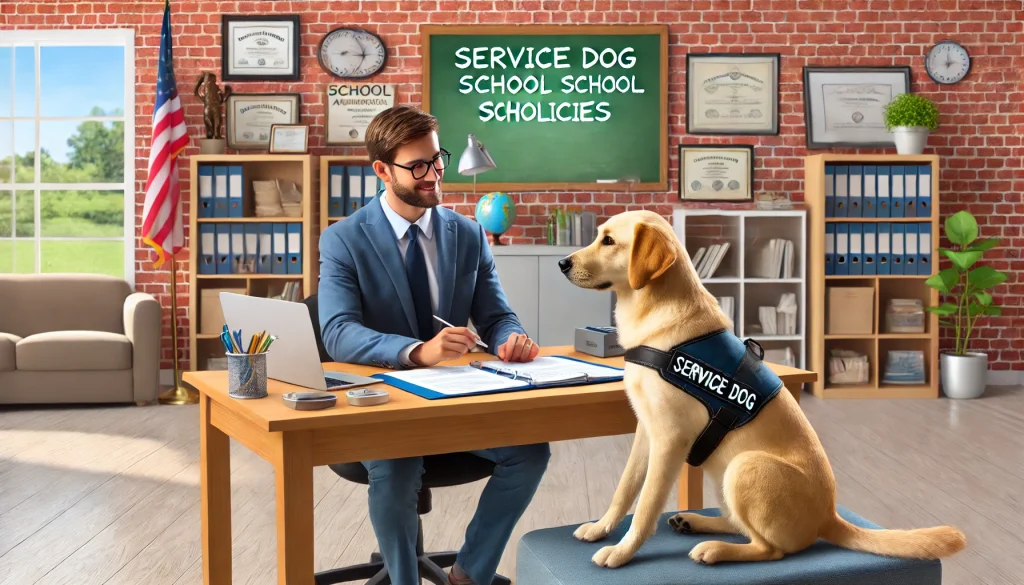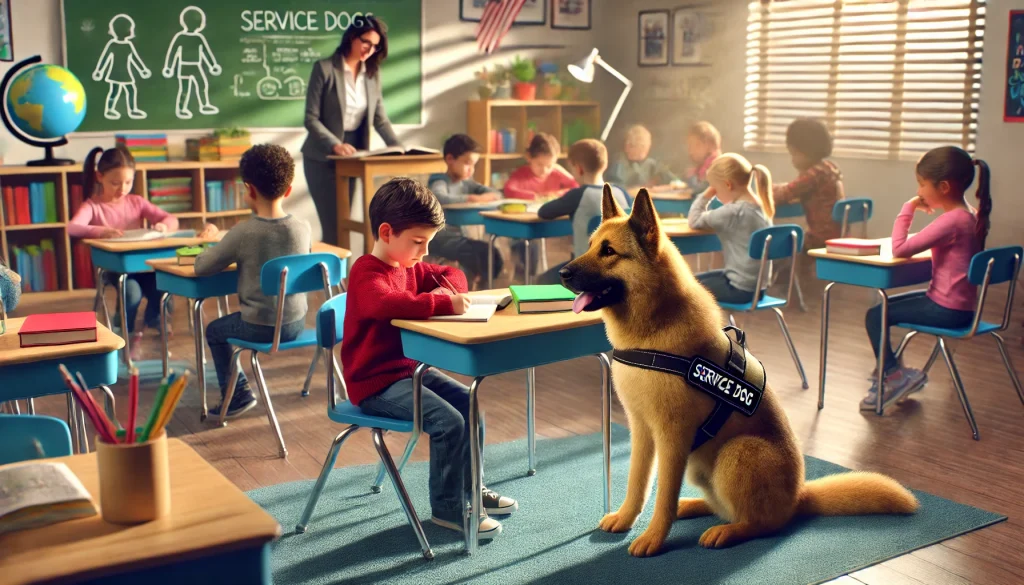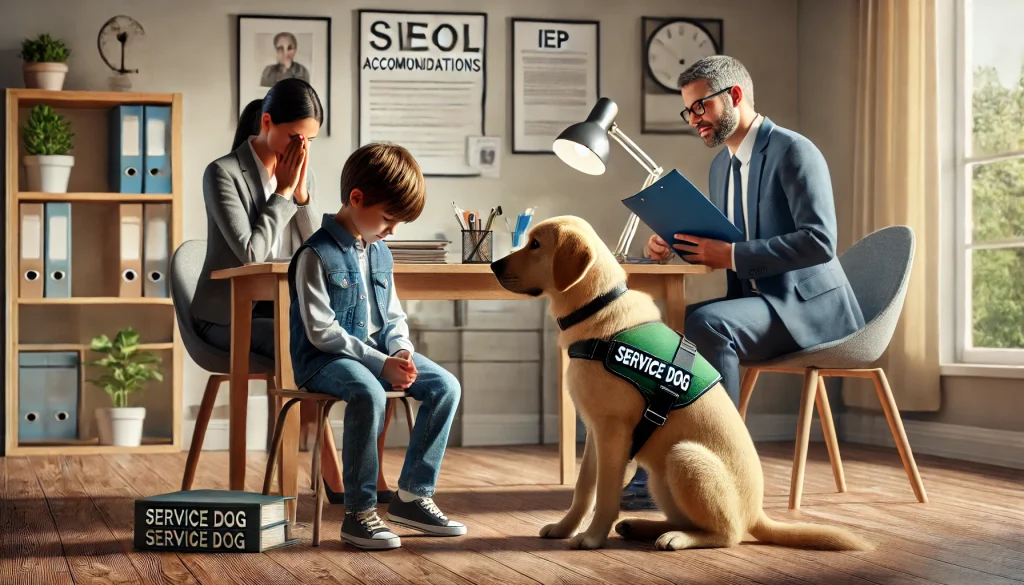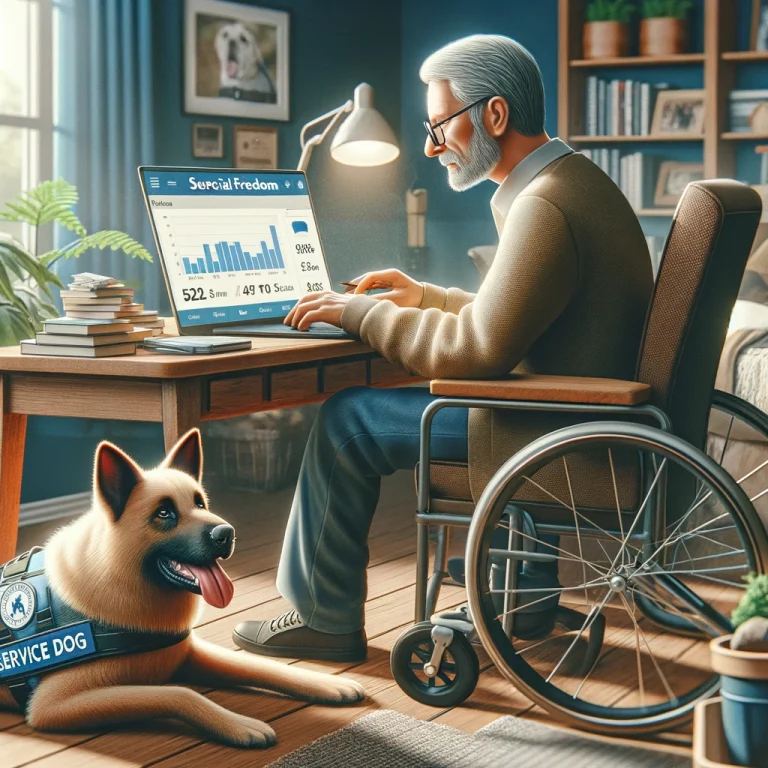Introduction
Service dogs provide invaluable support to individuals with disabilities, and their presence in schools can significantly enhance a student’s educational experience. For parents considering a service dog for their child, understanding the intricacies of service dog school policies, the benefits of service dogs in education, and navigating school accommodations is crucial. At ServicePupSolutions.com, we aim to equip you with the knowledge you need to make informed decisions for your child’s well-being.

Understanding Service Dog School Policies
Legal Rights and Regulations
The Americans with Disabilities Act (ADA) ensures that students with disabilities have the right to be accompanied by their service dogs in schools. Schools are required to make reasonable accommodations to allow service dogs to assist their handlers. Understanding these legal rights is the first step in ensuring that your child can benefit from having a service dog in school.
School District Policies
While federal law mandates access, individual school districts may have specific policies regarding service dogs. These policies might include requirements for documentation, proof of vaccinations, and behavior expectations. It’s important to familiarize yourself with your local school district’s policies to ensure compliance and smooth integration.
Required Documentation
Typically, schools will require documentation proving the dog’s training and the necessity of the service dog for the student’s disability. This can include a letter from a healthcare provider and certification from a recognized training organization. Having this documentation ready can expedite the process of getting approval from the school.

Benefits of Service Dogs in Education
Emotional and Social Support
Service dogs can provide significant emotional and social support to students with disabilities. They can help reduce anxiety, provide comfort during stressful situations, and improve overall mental well-being. This emotional stability can enhance a student’s ability to focus and participate in classroom activities.
Academic Improvement
The presence of a service dog can positively impact a student’s academic performance. Service dogs can assist with tasks such as retrieving items, alerting to medical issues, and providing physical support. This allows students to engage more fully in their educational activities without being hindered by their disabilities.
Enhanced Social Interaction
Service dogs can act as social bridges, facilitating interactions between students with disabilities and their peers. This can help reduce feelings of isolation and improve social skills. The companionship of a service dog can also boost a student’s confidence, encouraging them to participate more actively in school activities.

Navigating School Accommodations
Communicating with School Staff
Effective communication with school staff is essential for successfully integrating a service dog into the school environment. Arrange meetings with teachers, administrators, and school nurses to discuss your child’s needs and how the service dog will assist them. Providing educational materials about service dogs can also help staff understand the dog’s role and importance.
Creating an Individualized Education Plan (IEP)
If your child has an IEP, ensure that the inclusion of a service dog is part of this plan. The IEP should outline specific accommodations and support measures related to the service dog’s presence. This can include designated areas for the dog to rest, guidelines for interacting with the dog, and protocols for handling any issues that may arise.
Addressing Concerns and Questions
Some parents and students may have concerns or questions about the presence of a service dog in the classroom. It’s important to address these concerns proactively. Educate the school community about the role of service dogs and the benefits they provide. Clear communication can help mitigate any misunderstandings and create a supportive environment for your child.
Importance of Pet Insurance and Service Dog Products
Pet Insurance
Investing in pet insurance for your service dog is crucial. Pet insurance can help cover the cost of routine veterinary care, emergency treatments, and specialized medical procedures. Ensuring your service dog remains healthy is essential for them to effectively support your child.
Service Dog Products
Using the right service dog products can enhance your dog’s comfort and effectiveness. Consider items such as service dog vests, leashes, harnesses, and training tools. These products not only make it clear that your dog is a working animal but also ensure they can perform their tasks efficiently.
Self-Training Options
Resources for Self-Training
For parents interested in self-training their service dog, resources are available through ServiceDogOwners.com. This includes training guides, instructional videos, and support forums. Self-training can be a cost-effective and personalized approach to preparing your service dog for school environments.
Real Stories of Success
Emma’s Journey
Emma, a student with autism, has greatly benefited from having her service dog, Buddy, at school. “Buddy helps me stay calm and focused,” Emma says. “He makes it easier for me to handle stressful situations and participate in class.”
Alex’s Experience
Alex, who has a seizure disorder, shares how his service dog, Luna, has transformed his school experience. “Luna alerts me before a seizure happens,” Alex explains. “This gives me time to get to a safe place and reduces my anxiety about having seizures at school.”
The Future of Service Dogs in Schools
As awareness of the benefits of service dogs in education continues to grow, more schools are adopting inclusive policies to support students with disabilities. Continued advocacy and education are essential to ensure that service dogs can help more students succeed academically and socially.
Conclusion
Service dogs can provide invaluable support to students with disabilities, enhancing their educational experience and overall well-being. By understanding service dog school policies, recognizing the benefits of service dogs in education, and effectively navigating school accommodations, parents can ensure their children receive the support they need.
At ServicePupSolutions.com, we are dedicated to providing you with the resources and information necessary to make informed decisions about service dogs. Whether you choose professional training or self-training options through ServiceDogOwners.com, ensuring your service dog is well-prepared and supported is essential for their success in school.
Searching for a way to boost your income while keeping your service dog by your side? Learn how to launch a Side Hustle or new career and increase your earnings alongside your loyal companion. Click Here to find out more and start your journey today!






